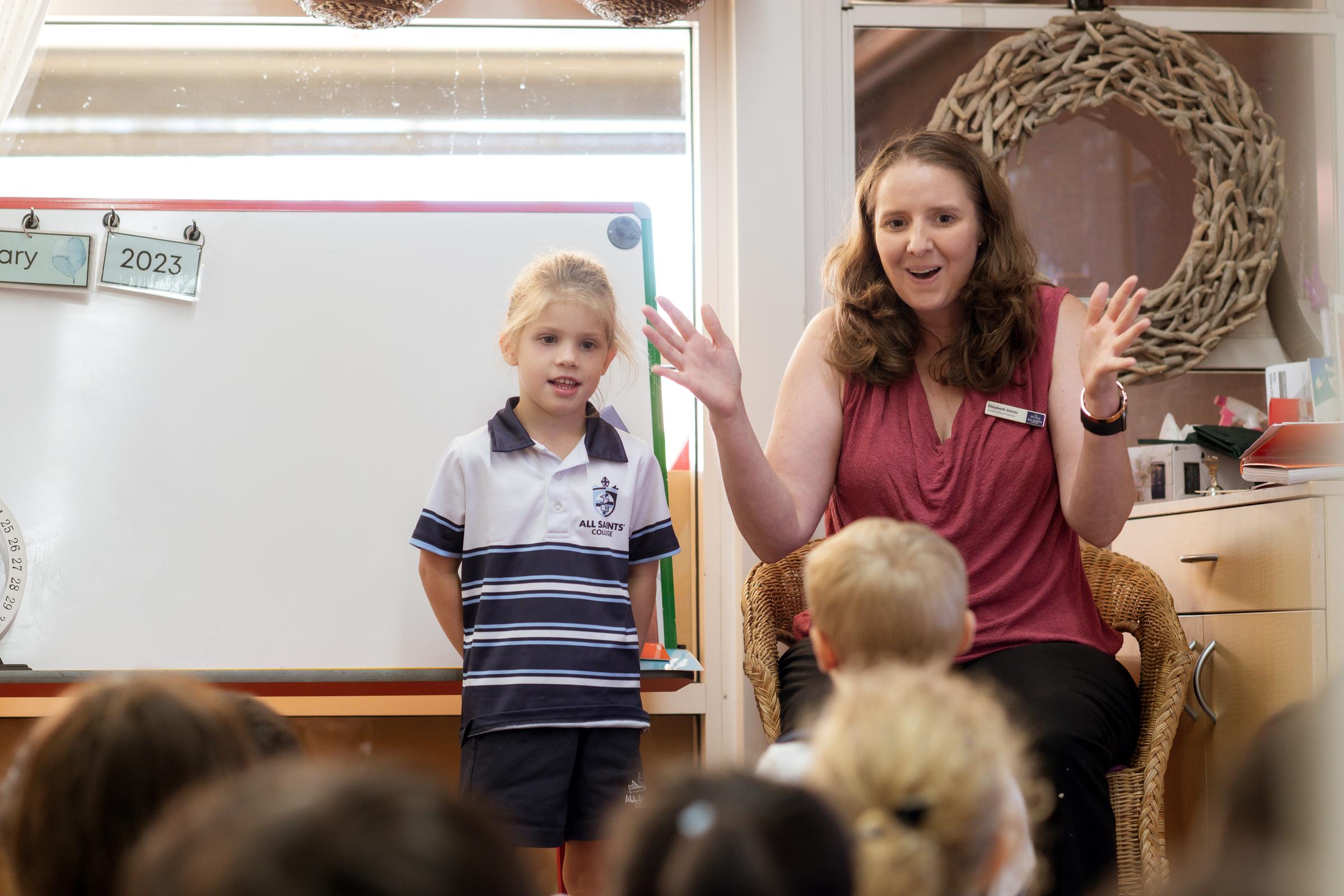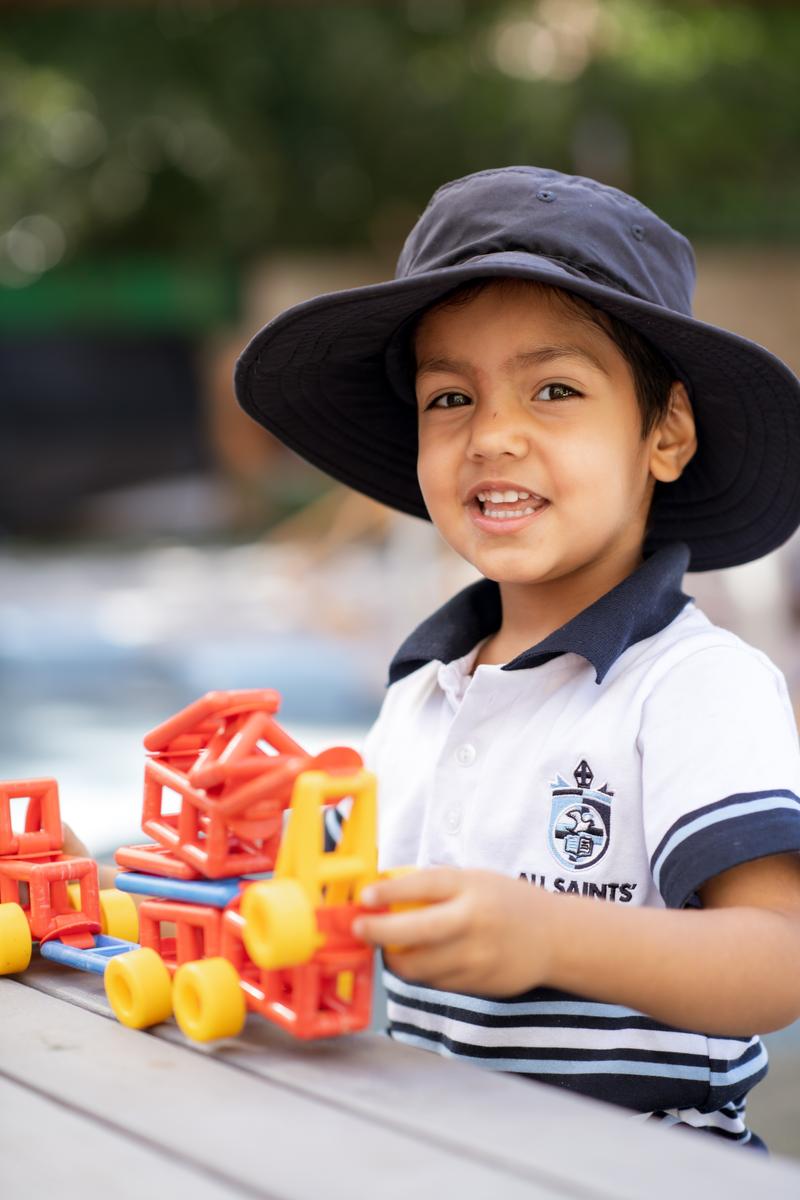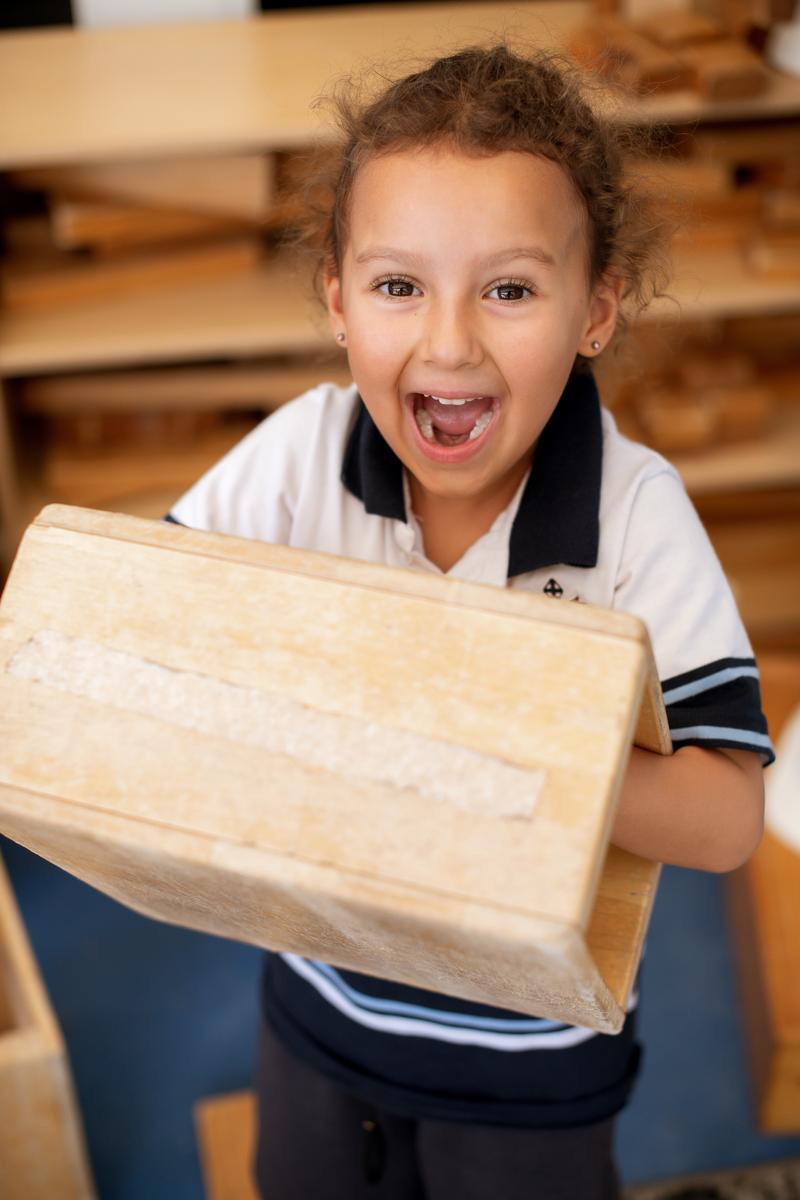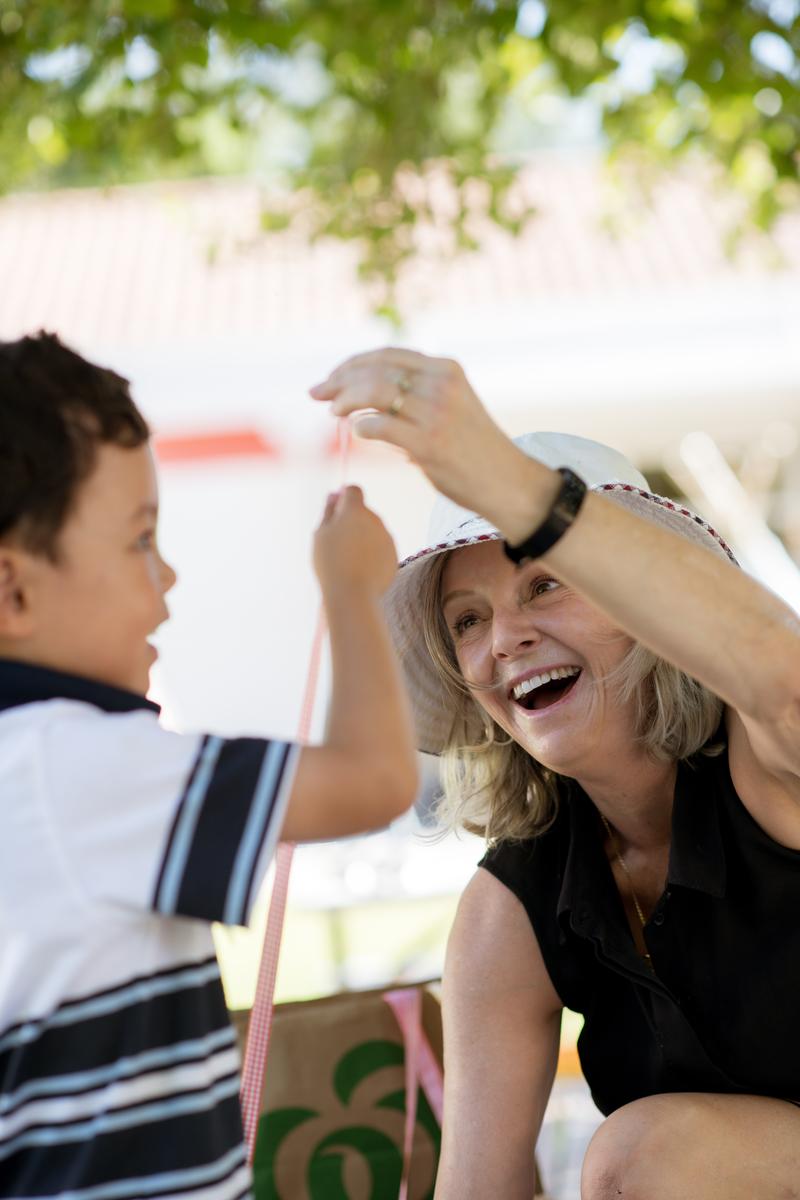Preparing for school - Tips for a smooth transition to Early Childhood classes

Anxious feelings are normal and expected during times of transition or change. This is especially true for children going back to school, or for first timers starting Pre-Kindergarten or a new school. This transition can be stressful and disruptive for the entire family. Prior to the first day of school, your anxious child may cling, cry, have temper tantrums, complain of headaches or stomach pains, withdraw, and/or become sullen or irritable.
Below are some helpful ideas for easing the transition to school for young children.
If after reading these suggestions you have further concerns regarding your child’s transition to school, please make contact with the College to arrange a meeting with your child’s teacher before the start of the new school year.
Prepare Yourself First
Handing over the care and responsibility of your child to teachers can be an uncomfortable time for some families.
Children take cues from their parents, so the more confidence and comfort you can model, the more your child will understand there is no reason to be afraid.
Read all the information that is sent out from the College to familiarise yourself with the routines and expectations for the first few weeks of school. As you become more comfortable with what to expect, your child will sense your feelings of excitement and enthusiasm rather than of worry and fear. If there is information you cannot find in the documentation provided, please do not hesitate to ask at the Orientation meetings or call the College to clarify.
Introduce yourself to your child’s teacher and familiarise yourself with the classroom routine to help support your child. Trust the teacher and your child will also learn to trust them. The teaching staff’s top priority is to look after your child and make them feel comfortable.
Talk about Kindergarten / School with your Child
This helps to familiarise them with what school is about and what to expect:
Talk regularly about what will be happening – “Mum and Dad will take you there, leave and then pick you up, for lunch at first, then in the afternoon. You will play with other children at Pre-Kindergarten. The teachers will look after you.”
Activities available will include painting, drawing, playdough, blocks for building, dolls, dress-ups, trains, trucks, paper, pencils, glue and collage materials, swings, a sandpit, monkey-bars, a hill to roll down, a fairy garden, musical instruments, books, puzzles, cubby house and dancing.
Talk about the teaching staff and how they will be there to look after your child.
Acknowledge your child’s feelings but tell them that they will be okay.
Drive past the school and stop to have a look at the playground and buildings.
Involve your child as much as possible in the buying, naming, and packing of equipment and uniform ready for school and talk with them about how to use or wear the items.
Keep a record on the calendar of how many days to go!
If either you or your child has any concerns or queries, please contact the College for clarification.
Boundaries and Expectations
All College classes have clear routines, boundaries and expectations in their Class Charters that support the children in their learning and wellbeing. Boundaries, both environmental and behavioural, provide a safe and secure setting for children. Children feel safe when they know what to expect and there are clear, consistent messages.
Limits and expectations consistently delivered by adults enable a child to predict what to expect and how to respond appropriately. Children’s behaviour is supported when the limits and boundaries are firm, fair, developmentally appropriate, and clearly stated.
By establishing boundaries at home, you are encouraging your child to behave in ways that meet your values. It helps them to develop their own self-discipline as they mature and enables them to respond to the College’s expectations. Children develop resilience as they learn to adapt to different settings, having been given clear guidelines on how to behave by those they trust.
Routines are a good way of developing boundaries and setting expectations, because they help children to predict what will happen next and reduce anxiety about the unknown.
Set Up and Practise Routines
Your child will adapt more easily to the ebb and flow of the Pre-Kindergarten or school day if you set up and put in place some of the following routines at home in the weeks prior to starting at the College:
Put away their own toys / plates, etc when they have finished using them.
Pack their bag with them so they know where items are.
Sit at a table to eat food independently.
Eat the foods that you will pack for them to eat at school.
Open their own lunchboxes, containers, and drink bottles.
Have a rest / quiet time after they have eaten their lunch, so they learn to lie quietly listening to music or reading a book to themselves.
Go to the toilet independently – wiping their own bottom and dressing and undressing themselves.
Putting items in set places (eg shoes by the door).
Find their own belongings, especially their hat and shoes.
Practise getting dressed independently.
Take off and put on their own shoes and socks independently (staff will assist with shoelaces).
Recognise their own name.
Practise routines for getting ready in the morning to ease the busyness of the day.
Develop bedtime routines at home, as lack of sleep affects children’s wellbeing. They may need to go to bed earlier than previously due to the demands of school.
Develop good eating habits so they have the right nutrition to support their learning.
Wait a short while before receiving immediate attention.
Take turns.
Starting School Routines
The following tips will help you and your child set up a predictable and reliable way of managing a new situation:
As you drop your child off, build a routine so they know what to expect each day, and be consistent.
Discuss with your child who will drop them off and collect them and make a picture chart showing who it will be.
Arrive at school on time in the morning for the start of Kindergarten or school day and be on time to collect them in the afternoon to avoid significantly increasing stress levels for your child. Arriving early in the morning is not helpful, as too much waiting is difficult for young children.
Be supportive yet firm. When saying goodbye in the morning, say it cheerfully – once! Ensure you do not reward your child’s protests, crying, or tantrums by allowing him or her to avoid going to school. Instead, in a calm tone say:
“I can see that going to school is making you feel anxious; however, I feel confident you can have a good day. You do have to stay now, and I will be back to pick you up later. Tell me what you are worried about, so we can talk about it.” Chances are, your child is anxious about something that requires a little problem-solving, role-playing, planning, and/or involvement from the teacher. You may want to talk about anxiety as something that is natural in new situations. However, project confidence in them and the teachers to handle any difficulties.
If you have concerns, also consider rehearsing some coping statements for your child to say to themselves when stressed, such as:
“I can be brave and have fun.”
“If I get worried or need help, I can ask the teachers.”
“I’ll have a play and then mum / dad / nanna will pick me up.”
“I got used to day care, I will get used to this.”
Find out about their school day by asking specific questions:
“Tell me two good things about your day.”
“What song did you sing?”
“What did you make today?
“What was the story about?”
Become familiar with the class routines so you can talk to your child about what will happen at school.
Talk with the teacher to share your concerns and to get to know him/her.
Listen to your child and listen without judgement. Verify the story with the teacher at a later time. Do not be too serious.
Expect your child to carry their own bag, to unpack their bag themselves, with your initial guidance, and bring their own water bottle into class themselves.
Ensure they have eaten breakfast and had a good night’s sleep!
Parents are encouraged to contact the Junior School on 9313 9334 to check on how their child has settled if they have any concerns.
Building College-Parent Partnerships
Be prepared to build a positive relationship with College staff and other parents.
Share information about your child to make a difference to their emotional wellbeing and learning – this is an important part of the long-term relationship between home and school.
Little things make a difference – let the College know when your child is unwell or is going to be absent. This is a courtesy as well as a child protection issue. If you have to collect your child during school hours, please visit Junior School Reception to sign your child out first, before going to the classroom.
Tell the teacher / College about major events and changes in your family that will impact on the child. Some examples of these changes are listed below.
A new sibling.
Changes in medical conditions, allergies, etc
Moving house.
A parent posted overseas or travelling away from home for extended periods.
Separation and divorce – custody arrangements.
Someone close to the child is dying.
Someone special visiting.
Let your child develop their own relationship with the teacher.
Read information on SeeSaw, MyASC, The College Courier and the Director of Junior School newsletter each week and check your child’s bag daily to see if anything has been sent home from school.
Transfer information and dates from letters onto a calendar at home – there are many dates and events throughout the year to keep track of!
Trouble-Shooting – What to do when you are worried or when there are problems
The following tips may help resolve issues effectively.
Approach your relationship with the College and the teacher with respect.
Refer to the College Community Charter.
Avoid getting into a discussion with the teacher before school – arrange a time to talk with the class teacher when neither of you will be under pressure to be somewhere else. The class teacher is the first person you speak to about your child. Share your concerns with the teacher before speaking to anyone else.
Be open to working out the concerns together – really believe there is no single answer or one right way to do things.
Acknowledge your child’s feelings and their view of the issue.
Be prepared to listen to other points of view and try to keep an open mind.
Most situations or issues are complex, so it is important not to jump to conclusions; try not to blame.
Be fair.
Develop a relationship built on trust.
Name Everything
This makes it easy for your child to identify their belongings, as well as for adults and other children to return your child’s items to them.
Name every item of clothing, including hat, art smock, shoes, and socks, sleeping bag, school bag, library bag, water bottle, lunch box, lunch box containers, ice pack.
Clearly write your child’s preferred name and surname on every item.
Use black marker pen or name tags (name tags do come off with wear and tear, unless sewn on).
Name items in easy-to-see places.
So that your child can identify their own personal items easily on their own, especially while they are learning to recognise their name,
Add a child-friendly key ring to your child’s school bag.
Sew a button or ribbon to your child’s sleeping bag on the top corner of the light panel alongside their name.
Our Expectations
Knowing what the class program will involve will help you talk with your child about what to expect. They are separate for each class and placed on My ASC in your child’s year level page. These will be updated each term and available by the end of Week 2.
Our Early Childhood programs, in particular our Pre-Kindergarten–Pre-Primary programs, are designed for children to:
love learning
play to learn
learn how to learn
make choices
be involved in a wide range of activities, including individual, partner, small-group, and larger-group activities
develop social and emotional skills to become resilient
be challenged to think further about what they are learning
record their learning
learn indoors and outdoors
develop their ability to use a wide range of words to communicate their needs, wants, thoughts and ideas
explore the world through their senses
be respectful of themselves, others and the environment
be creative using a variety of media
learn to share and take turns appropriately
feel confident and happy in their school environment; and
have routines, including eating and resting times.



